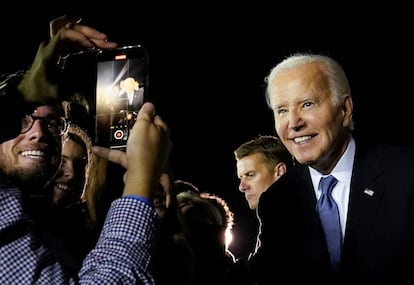‘Operation replace Biden’: The process to find a potential new candidate
The president’s disastrous debate with Trump has led to calls within the liberal ranks to find an alternative nominee. There is little precedent for it, but there is still time


One of the worst nights of Joe Biden’s political career, the disastrous debate that pitted him against his rival Donald Trump, had not yet ended, and a taboo had already been broken regarding a subject that has been at the forefront of Democratic Party conversations for the past two years. What if the time had finally come to recognize that, due to his advanced age, the president is not the ideal candidate not just to lead the world’s leading power for another four years, but to minimally be able to stand up to his rival? And above all: would there still be time to find a replacement before the November election?
Some of the most prominent columnists of the liberal media—meaning, those closest to the Democrats—rushed to certify the death of the elephant in the room. “Was the debate the beginning of the end of Joe Biden’s presidency?” asked Susan Glasser in The New Yorker. “Time to go, Joe,” Mark Leibovich warned in The Atlantic. And Thomas L. Friedman, with the classic tone of “this hurts me more than it hurts you,” wrote in The New York Times: “Joe Biden is a good man and a good president. He must bow out of the race.”
On Friday, day one after the debate, it did not appear that Biden’s plans included throwing in the towel, but there would still be time to replace him as a candidate in November, using a somewhat tangled and, above all, rusty mechanism that has not been used for decades.
The lack of recent precedents makes everything more complicated, but at least one thing is clear. The rules of the Democratic National Committee do not provide any mechanism for the leaders to initiate Operation Replace Biden by themselves. He could step aside. And it is also possible for someone, any member of the party, to launch a challenge during the party convention, which this year will be held in Chicago starting on August 19.
Almost 4,000 delegates from all over the country will attend, 95% of whom Biden won for his cause during primaries in which he had practically no opposition. It is traditionally assumed that these delegates will support the majority candidate, but they are not required by any rule to do so. At that point, more than half of those 3,894 members who gave him a yes would have to change their minds and vote against Biden this time around.
The convention rules also contemplate the possibility of the candidate himself declining his party’s designation. That would also be an excursion into little-explored territory, but at least it would add interest to a gathering that for decades has been seen as a mere procedural event rather than a space for a debate about the future. No one can, however, rule out that this renewed interest could lead the convention into chaos, with multiple votes for more days than initially planned at an event that, in principle, will draw the curtain on August 23.
An open convention
In that case, what is known (or rather, used to be known) as an “open convention” would be held, in which the candidate is chosen on the fly and after an arduous process of negotiations and compromises behind closed doors.

The last time something like this happened was in 1968, a turbulent year that keeps coming up as a mirror of 2024. The Democratic convention was then the scene of loud protests against the Vietnam War; leftist groups have warned that they plan to make themselves heard at this year’s convention over their opposition to Biden’s policy of supporting Israel in the war in Gaza. The 1968 convention was also a chaotic one, held a few months after President Lyndon B. Johnson announced that he was not going to run for re-election and which produced a weak candidate, Hubert Humphrey, whom Richard Nixon defeated by a landslide. After that, the primary process was established to avoid new scares like that one.
The logic this year is that if Biden has to be replaced, the chosen one would be the vice president, Kamala Harris, especially in the event that the boss stepped aside of his own free will and named her his successor. This move would not, however, be binding for party members. And Harris would have another problem on her plate: who to choose as her running mate?
Other names that are being tossed around as potential Biden replacements include the governors of California, Gavin Newsom, Michigan, Gretchen Whitmer, Illinois, J. B. Pritzker, Maryland, Wes Moore, and Pennsylvania, Josh Shapiro. All of them have repeatedly denied that replacing Biden is among their plans.
Although just to make things even more complicated in this country, one can always reliably count on the particular laws of one of the 50 states. Ohio has set August 7 as the deadline to accept the name of the candidate for the White House, and, since this year the Democratic convention is being held later than usual, the Democratic National Committee has decided to organize a virtual vote so that Biden can comply with that requirement.
That unpleasant feeling of time slipping through one’s fingers is another takeaway of Thursday’s disastrous debate outcome for Biden, who arrived at the White House promising that he would be a transitional president and that he would quickly hand over the baton to someone else, then overcame all the tests that the office put before him. A poor result in the midterm elections would have encouraged a discussion within the party about the convenience of finding a replacement, but the Democrats managed to stop the Republican Party at the polls, which gave their leader renewed confidence. And last February, Biden appeared before the world in a State of the Union address in which he surprised everyone with his strong performance, so that again no one dared to question his leadership.
The question, now that he has shown his most vulnerable side, is whether it is not too late to carry out Operation Replace Biden.
Sign up for our weekly newsletter to get more English-language news coverage from EL PAÍS USA Edition
Tu suscripción se está usando en otro dispositivo
¿Quieres añadir otro usuario a tu suscripción?
Si continúas leyendo en este dispositivo, no se podrá leer en el otro.
FlechaTu suscripción se está usando en otro dispositivo y solo puedes acceder a EL PAÍS desde un dispositivo a la vez.
Si quieres compartir tu cuenta, cambia tu suscripción a la modalidad Premium, así podrás añadir otro usuario. Cada uno accederá con su propia cuenta de email, lo que os permitirá personalizar vuestra experiencia en EL PAÍS.
¿Tienes una suscripción de empresa? Accede aquí para contratar más cuentas.
En el caso de no saber quién está usando tu cuenta, te recomendamos cambiar tu contraseña aquí.
Si decides continuar compartiendo tu cuenta, este mensaje se mostrará en tu dispositivo y en el de la otra persona que está usando tu cuenta de forma indefinida, afectando a tu experiencia de lectura. Puedes consultar aquí los términos y condiciones de la suscripción digital.








































